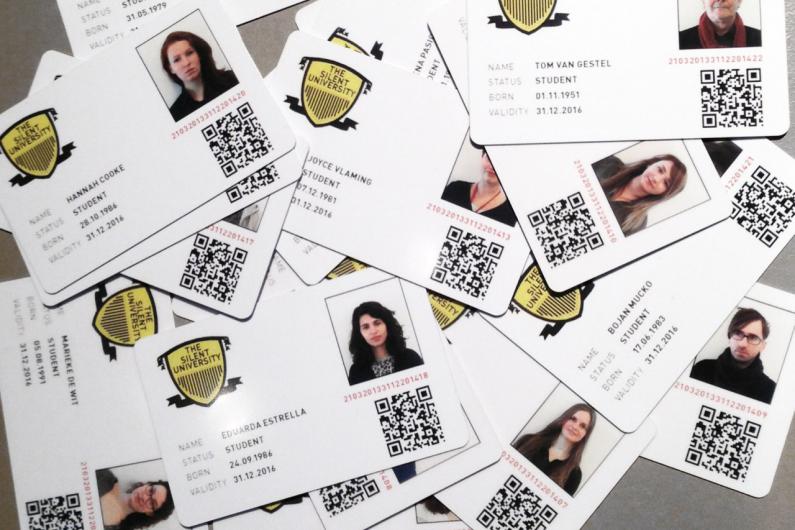Hosted by Florian Malzacher
Gesellschaftsspiele: The Art of Assembly XVII in Cooperation with Uniarts Theatre Academy Helsinki – ASSEMBLING KNOWLEDGE
with Satu Herrala, Ahmet Öğüt & Lotte van den Berg
At least since Joseph Beuys’ legendary “International College for Creativity and Interdisciplinary Research” artistic assemblies are also a playing field for the production and transfer of knowledge. The 17th edition of “The Art of Assembly investigates along concrete artistic practices how tools and experiences from performing arts offer settings and strategies for unexpected communication and transversal education: Choreographer and curator Satu Herrala in her works focusses on embodied knowledges in artistic and curatorial work, creating conditions for art to summon collective and transformative agencies. Artist Ahmet Öğüt – initiator of the Silent University, a solidarity-based knowledge exchange platform by displaced people and forced migrants- often seeks his collaborators outside the art field. Theatre maker Lotte van den Berg, one of the initiators of the ongoing project “Building Conversation”, centers her practice around collective experiences and the relation between performance and social as well as ecological challenges. How can art offer spaces for empowerment and self-development?
 Visit art-of-assembly.net for videos, podcasts and background info
Visit art-of-assembly.net for videos, podcasts and background info
About The Art of Assembly. Lectures, discussions, online platform
Whether in Tunis, Cairo, Madrid, or Lisbon, in Athens, New York, London, or Istanbul, in post-Fukushima Tokyo, in the midst of Niemeyer’s iconic parliamentary architecture in Brasilia, under the umbrellas of Hong Kong, or on the streets of Minneapolis: social and political movements of recent years have often been characterised by their search for alternative forms of gathering, of arguing and making decisions, of negotiating community and society. The potential of these assemblies lies in more than just the demands they put forward; many of them change reality merely by practicing radical models of democracy.
The arts have also shown a renewed interest in concepts of gathering and creating public spheres in which society is not only mirrored but constantly tried out, performed, tested, reimagined, or even reinvented. There are court hearings on artistic freedom, religion, and censorship; tribunals on exploitation and violence; summits on climate change or cultural policy; parliaments allowing those who are usually silenced to speak... Theatre in particular has become a stage for assemblies on the fine line between art and reality, a democratic arena of radical imagination.
But what is the future this concept of gathering has ahead of it after months in a state of emergency that has thrown pretty much all areas of social life out of step? Gesellschaftsspiele: The Art of Assembly brings together protagonists from various fields of art, politics and theory to speculate on the future of assembly in a time of experiencing that nothing is certain – a time in which every form of physical togetherness has become precarious.
Florian Malzacher is a curator, dramaturg and writer. 2013-2017 he was artistic director of Impulse Theater Festival (Cologne, Dusseldorf and Mulheim/Ruhr), and 2006–2012 co-programmer of the multidisciplinary arts festival steirischer herbst (Graz). He (co-)curated e.g. the 4th and 5th International Summer Academy (Mousonturm Frankfurt, 2002 and 2004), “Dictionary of War” (2006/07), “Truth is concrete” (Graz, 2012), “Artist Organisations International” (HAU Berlin, 2015), “Appropriations” (Ethnological Museum Berlin, 2014), “Sense of Possibility” on the occasion of the 100th anniversary of the revolution (St. Petersburg, 2017), “Training for the Future” (Ruhrtriennale 2018/19 with Jonas Staal), “After Supervising the Machinery” (2020). As a dramaturge he worked with artists like Rimini Protokoll (DE), Lola Arias (ARG), Mariano Pensotti (ARG), and Nature Theater of Oklahoma (USA). Florian Malzacher has edited and written numerous essays and books on theatre and performance and on the relationship between art and politics. His latest publications include Gesellschaftsspiele. Politisches Theater heute im Alexander Verlag Berlin. florianmalzacher.tumblr.com
The Art of Assembly is based on
Florian Malzacher. Gesellschaftsspiele. Politisches Theater heute. Berlin: Alexander Verlag, 2020.
Credits
Former guests Didier Eribon Chantal Mouffe, Sibylle Peters, Julia Ramírez-Blanco, Milo Rau, Oliver Ressler, Dana Yahalomi / Public Movement, Jodi Dean, Jonas Staal and many more Curated by Florian Malzacher
The Art of Assembly – Gesellschaftsspiele, a series by Florian Malzacher and brut Wien, in cooperation with Münchner Kammerspiele, Wiener Festwochen, Volksbühne am Rosa-Luxemburg-Platz (Berlin), BIT Teatergarasjen / METEOR 2021, NT Gent, Kunsthalle Vienna, Theatre Academy Uniarts Helsinki and Goethe-Institut / Performing Architecture.
Dates & Tickets
May 2022
livestream here at brut-wien.at (free if charge)
Online Livestream via brut-wien.at
Event recommendations
Kopf hoch & Simon Mayer
Colourful Greyzones – Live in Concert
Alix Eynaudi
Noa & Snow – Poem #9
a film collection, a book launch, a poetry reading, a good-bye Noa & Snow cocktail-party!!
brut all over Vienna
brut nordwest
accessible
Nordwestbahnstraße 8-10, 1200 Vienna
Subway: U1, U2 (Praterstern), U4 (Friedensbrücke), U6 (Dresdnerstraße) Tram: 5 (Nordwestbahnstraße) Bus: 5A (Wasnergasse)
accessible
studio brut
not accessible
Zieglergasse 25, 1070 Wien
Subway: U3 (Zieglergasse), Tram: 49 (Westbahnstraße / Zieglergasse)
not accessible
Bears in the Park Art Place
not accessible
Eyzinggasse 12, 1110 Vienna
U-Bahn: U3 (Gasometer) Bus: 72A (Gasometer), 76A, 76B (Simoningplatz)
not accessible
WUK performing arts
barrierefrei
Währinger Straße 59, 1090 Vienna
Subway: U6 (Währinger Straße / Volksoper), Tram: 40, 41, 42 (Währinger Straße / Volksoper), 5, 33 (Spitalgasse), 37, 38, 40, 41, 42 (Spitalgasse / Währinger Straße)
Der Betrieb
accessible
Vogelweidplatz 13, 1150 Wien
Subway: U6 (Burggasse-Stadthalle) / Bus: 48A (Moeringgasse) / Tram: 9 (Camillo Sitte Gasse)








